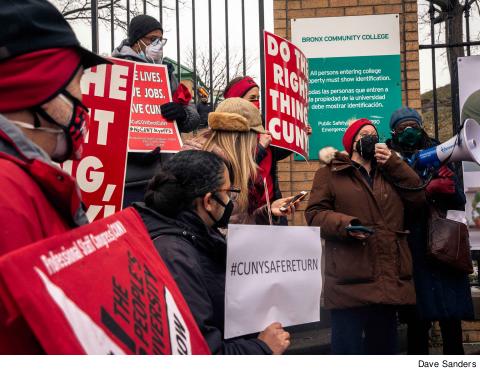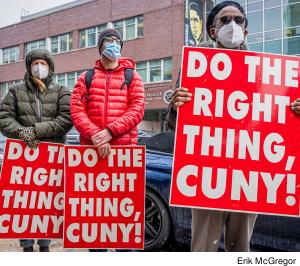Adjuncts hurt by class cancellations
 |
Omicron ravaged New York City in January and CUNY was no exception. More students opted for online classes, affecting the enrollment of many in-person classes. The PSC responded to the crisis, demanding that college presidents “allow under-enrolled Spring semester classes to go forward as planned and to shift to online courses as appropriate to keep adjuncts on [the] payroll and maintain health insurance for insured adjuncts.” In a statement, the union also demanded that CUNY negotiate and clarify the state’s employee vaccine mandate, expand testing and provide medical-grade masks to all CUNY community members.
Although CUNY Central stuck to a mandate requiring that a minimum of 70% of classes be in-person for far longer than facts on the ground warranted, the union succeeded in preventing many layoffs and course cancellations by pressuring college administrations to reduce class size minimums and move classes online. Campus PSC activists also successfully helped reverse many denials for remote work requests for members.
NO CLARITY
However, CUNY failed to clarify implementation deadlines and processes for the faculty and staff vaccine mandate by the start of the semester, despite the union’s persistent demands to negotiate these questions. At press time, the University had also failed to address the union’s demands for masks and expanded testing. Union leaders noted that CUNY’s refusal to go remote for the first two weeks of the semester was unsurprising given the political climate.
Students, faculty and staff mobilized with urgency against a chaotic start to the semester.
Members rallied at Bronx Community College (BCC) and Medgar Evers College on the first day of the semester, January 28, in response to CUNY administration’s failure to adequately address safety concerns. At the Medgar event, the PSC gave away masks, while at the Bronx rally, Sharon Utakis, PSC vice president for community colleges and a former BCC chapter chair, spoke about the concerns around classes with low enrollment.
“Some colleges have been allowing small classes to run and have shifted some courses online, but it’s been very last minute and disorganized. Here at BCC, at the end of last week, some low-enrolled, in-person classes were converted to online. But it was a mess. Only classes with fewer than five students could be converted. I had a class with six,” said Utakis.
She added, “I know that some students and faculty desperately want to go back to in-person classes, but many do not. CUNY management didn’t listen to that and didn’t plan for that, and they insisted on counting hybrid classes as online, which is contrary to how they were counted in the past.”
At the Medgar rally, City Council Member Crystal Hudson, whose district includes the college, said, “The demands are clear: come to the negotiating table in good faith, provide workplace protections and work with faculty and staff to address the impact of under-enrollment.”
PSC President James Davis (see President’s message) explained in a recent Daily News op-ed, “One-third of the 105 academic department chairs across CUNY who responded to our recent survey report[ed] pressure from the administration to cancel low-enrolled, in-person classes. These departments and their faculty complied with a uniform administrative requirement, revising and resubmitting schedules repeatedly and in good faith. Colleges made commitments to faculty and students. CUNY must now avoid canceling classes due to low enrollment.”
ENROLLMENT DECLINES
Enrollment declines coupled with CUNY’s miscalculations have taken a disproportionate toll on adjunct instructors.
“Because the CUNY administration has so badly mismanaged the response to COVID-19, many colleges have faced severe enrollment crises this semester,” said Rosa Squillacote, the PSC vice president for part-time personnel. “Some colleges have responded by lowering class sizes, a reminder that oversized classes are always a choice of the administration. But other colleges have simply canceled classes and adjuncts are just now being notified that they won’t have the classes, and thus income, they relied on.”
David Klassen, an adjunct assistant professor of ethnic and race studies at Borough of Manhattan Community College, said CUNY’s intransigence has shortchanged adjunct faculty and students alike. He told Clarion in an email, “Online classes are largely full and even have waitlists, while in-person classes are under-enrolled and likely to be cut as they fall below the set minimums. But instead of moving these classes online, administrators are stubbornly clinging to a 70/30 breakdown of in-person to online classes.”
HURTING STUDENTS
Klassen added that this amounted to a “back-to-normal, back-to-work” ideology that would inevitably leave students behind in their studies. “We know from previous studies that many of these students will not be able to make this up later,” he said.
Senior faculty members like Glenn Petersen, a professor of anthropology at Baruch College, fear that CUNY Central’s lack of leadership will force union members like him to choose between retirement and continuing to work in what many feel is an unsafe environment.
“The way CUNY is stumbling around makes it likely that for my own health and safety – at 75, I’m a lot more physically vulnerable than I’d like to admit – I will have to abandon an institution I’ve called home for a half century,” Petersen said.
That could have devastating consequences, not just for teaching, but for the entire university.
AN EXODUS?
“If enough of CUNY’s senior faculty determine that they cannot hang on, the university will be left without a cohort who is deeply devoted to its success and able to see us through this latest challenge,” Petersen said. “CUNY Central very much needs to think about the unintended consequences of its equivocations and find ways to make us all feel a lot safer and a lot more trusting in our leadership.”
 |
The PSC has many political allies who have amplified the call to ensure health and safety on CUNY campuses for students, faculty and staff. State Assembly Member Yudelka Tapia and City Council Member Crystal Hudson both spoke at the January 28 union rallies. The PSC also received additional statements of support from City Council Member Rita Joseph and City Council Committee on Higher Education Chair Eric Dinowitz.

